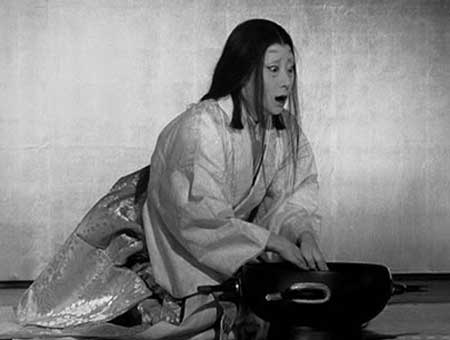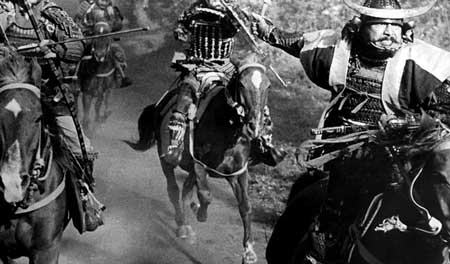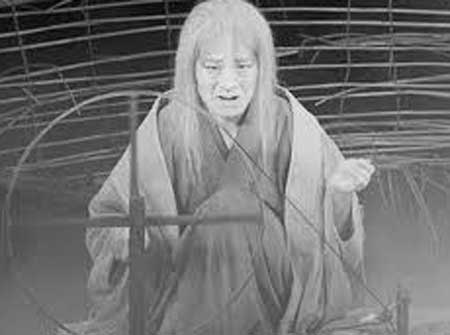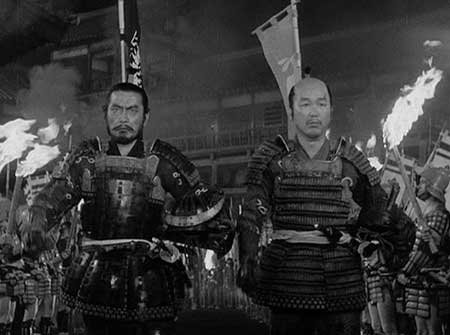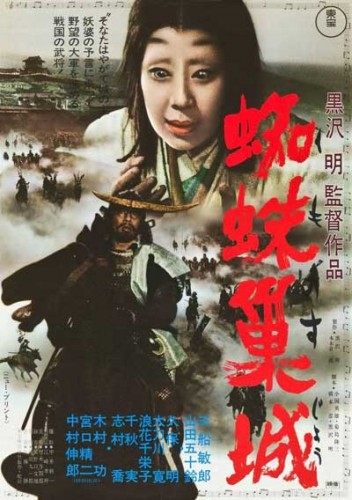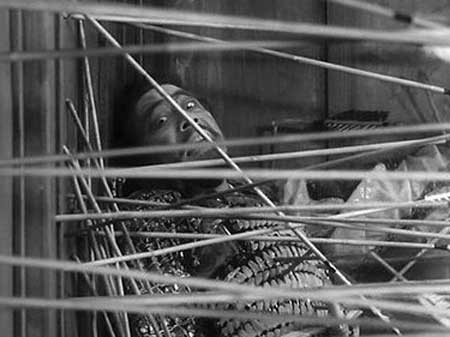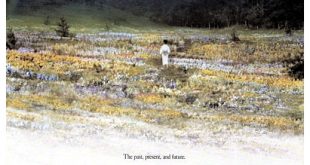A war-hardened general, egged on by his ambitious wife, works to fulfill a prophecy that he would become lord of Spider’s Web Castle.
REVIEW:
“The devil’s path will always lead to doom.”
Akira Kurosawa’s brilliant adaptation of Shakespeare’s classic tragedy, Macbeth, is certainly one of the greatest representatives of its cinematic form. Portrayed by the great Toshiro Mifune, Washizu is the proverbial Macbeth, a highly regarded tactician amongst his peers and his close friend, Miki (Banquo). For Washizu and Miki, the highest accomplishment is to be lord of Cobweb Castle. It is an environment of bleeding clouds of fog and rolling hills accompanied by the dense and labyrinthine, Cobweb Forest. For most, the forest is an impenetrable maze of redundancy but for Washizu it is familiar ground. The arrogance of the Macbeth character begins with his tactical talents and good fortune and blossoms when reality begins to contradict his virtuosity.
The film progresses, more or less, the same as in the original play. Washizu and Miki are two of the highest valued samurai in the Shogunate army, respected for their valour and fortitude. When we meet them, they are attempting to reunite with their superiors following a harrowing battle. Uncharacteristically, they become lost in Cobweb Forest. Washizu is wary. Within the forest they encounter an old woman spinning thread (“Men are vain mortals; life is but a thread, a leash at which men strain and yelp, a stalk on which ambition blooms and withers”), she is the Kurosawa equivalent of the Three Witches.
She cryptically foretells their futures: Washizu will be promoted to North Mansion and Miki will be assigned to Fort One. She also intones that Washizu will later become lord of Cobweb Castle but Miki’s son will succeed him. The two men laugh off such notions as absurd yet, when they return to the Shogunate, they are both promptly promoted, as predicted. What follows is the age old story of greed and betrayal. It is a cautionary tale depicting the fine line between ambition and the insatiable lust for power.
The external is very prevalent in Kurosawa’s film. There are many shots that stare far into the distance slightly obscured by the omnipresence of thick fog. Actors are surrounded by symmetries of various structures; they are always enclosed, alone. All of them are bound by fate’s cold hand, often unforgiving always unscrupulous. The only remaining freedom left is pride and status. One, daring enough, can achieve one’s desired status and pride can be forged from within. This is the world in which Washizu lives and he, like many before and after him, is set on advancing to as high a status as possible.
A key supposition of Shakespeare’s original play (which is preserved in this adaptation) is whether Macbeth/Washizu’s promotion to lord of Cobweb Castle would have occurred even without his murderous intervention. This is the ultimate failing of Washizu. Despite the lure of avarice and the fork-tongued enabling of a selfish wife, it is the doubt in his own ability and friends (namely Miki) that bring about his downfall. Washizu’s wife, Asaji, is a much more subtle portrayal of Lady Macbeth. Her words are quiet but suggestive; her methods delicate but insidious. Her power lies not in directness or intimidation but by instilling doubt and implying danger. In short, the story is easily transposed to feudal Japan in that the interactions of these characters, of varying levels of status and position, do not stray from the reality of the era.
The ending of the film is immensely memorable and masterfully done. Mifune plays Washizu with effortless intensity; his descent into madness brims with obsessive rants and passionate grimaces and silent stewing. Kurosawa directs with his minimalist visual flair, rendering some scenes, such as Washizu’s hallucination and the ‘moving forest’ near the end of the film, with virtuosic effectiveness. Not to mention, Kurosawa’s use of choreographed archers to achieve Washizu’s death scene (a dangerous but impressive feat to be sure). It is easily one of Kurosawa’s (and Mifune’s) greatest accomplishments, not to mention one of the finest adaptations of Shakespeare’s works alongside Welles’ Othello and Olivier’s Richard III.
Rating: A
+ Wonderful set and costume design (as per usual for Kurosawa), confidant and succinct direction, intense acting, and one of the more faithful film adaptations to the original play.
– Some lulling moments, some redundant scenes – minor quibbles.
 Horror News | HNN Official Site | Horror Movies,Trailers, Reviews
Horror News | HNN Official Site | Horror Movies,Trailers, Reviews

